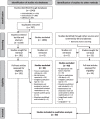Risk factors for medication-related short-term readmissions in adults - a scoping review
- PMID: 37770912
- PMCID: PMC10536731
- DOI: 10.1186/s12913-023-10028-2
Risk factors for medication-related short-term readmissions in adults - a scoping review
Abstract
Background: Hospital readmissions due to medication-related problems occur frequently, burdening patients and caregivers emotionally and straining health care systems economically. In times of limited health care resources, interventions to mitigate the risk of medication-related readmissions should be prioritized to patients most likely to benefit. Focusing on general internal medicine patients, this scoping review aims to identify risk factors associated with drug-related 30-day hospital readmissions.
Methods: We began by searching the Medline, Embase, and CINAHL databases from their inception dates to May 17, 2022 for studies reporting risk factors for 30-day drug-related readmissions. We included all peer-reviewed studies, while excluding literature reviews, conference abstracts, proceeding papers, editorials, and expert opinions. We also conducted backward citation searches of the included articles. Within the final sample, we analyzed the types and frequencies of risk factors mentioned.
Results: After deduplication of the initial search results, 1159 titles and abstracts were screened for full-text adjudication. We read 101 full articles, of which we included 37. Thirteen more were collected via backward citation searches, resulting in a final sample of 50 articles. We identified five risk factor categories: (1) patient characteristics, (2) medication groups, (3) medication therapy problems, (4) adverse drug reactions, and (5) readmission diagnoses. The most commonly mentioned risk factors were polypharmacy, prescribing problems-especially underprescribing and suboptimal drug selection-and adherence issues. Medication groups associated with the highest risk of 30-day readmissions (mostly following adverse drug reactions) were antithrombotic agents, insulin, opioid analgesics, and diuretics. Preventable medication-related readmissions most often reflected prescribing problems and/or adherence issues.
Conclusions: This study's findings will help care teams prioritize patients for interventions to reduce medication-related hospital readmissions, which should increase patient safety. Further research is needed to analyze surrogate social parameters for the most common drug-related factors and their predictive value regarding medication-related readmissions.
Keywords: Adverse drug reactions; Drug-related problems; Drug-related readmissions; General internal medicine; Hospital readmission; Medication safety; Prediction; Risk factors; Scoping review.
© 2023. BioMed Central Ltd., part of Springer Nature.
Conflict of interest statement
The authors declare no competing interests.
Figures
Similar articles
-
Prevalence of and Risk Factors for Drug-Related Readmissions in Older Adults: A Systematic Review and Meta-Analysis.Drugs Aging. 2024 Jan;41(1):1-11. doi: 10.1007/s40266-023-01076-8. Epub 2023 Oct 21. Drugs Aging. 2024. PMID: 37864770 Free PMC article.
-
Medication-related hospital admissions and readmissions in older patients: an overview of literature.Int J Clin Pharm. 2020 Oct;42(5):1243-1251. doi: 10.1007/s11096-020-01040-1. Epub 2020 May 30. Int J Clin Pharm. 2020. PMID: 32472324 Free PMC article. Review.
-
Beyond the black stump: rapid reviews of health research issues affecting regional, rural and remote Australia.Med J Aust. 2020 Dec;213 Suppl 11:S3-S32.e1. doi: 10.5694/mja2.50881. Med J Aust. 2020. PMID: 33314144
-
Prevalence and Preventability of Drug-Related Hospital Readmissions: A Systematic Review.J Am Geriatr Soc. 2018 Mar;66(3):602-608. doi: 10.1111/jgs.15244. Epub 2018 Feb 22. J Am Geriatr Soc. 2018. PMID: 29468640
-
30-Day Potentially Avoidable Readmissions Due to Adverse Drug Events.J Patient Saf. 2021 Aug 1;17(5):e379-e386. doi: 10.1097/PTS.0000000000000346. J Patient Saf. 2021. PMID: 28306610
Cited by
-
Danger Ahead-You Are Being Discharged.Can J Hosp Pharm. 2024 Jun 12;77(2):e3622. doi: 10.4212/cjhp.3622. eCollection 2024. Can J Hosp Pharm. 2024. PMID: 38868324 Free PMC article. No abstract available.
-
Danger droit devant: le moment du congé hospitalier est arrivé.Can J Hosp Pharm. 2024 Jun 12;77(2):e3647. doi: 10.4212/cjhp.3647. eCollection 2024. Can J Hosp Pharm. 2024. PMID: 38868326 Free PMC article. French. No abstract available.
-
Pharmacist-led interventions at hospital discharge: a scoping review of studies demonstrating reduced readmission rates.Int J Clin Pharm. 2025 Feb;47(1):15-30. doi: 10.1007/s11096-024-01821-y. Epub 2024 Dec 9. Int J Clin Pharm. 2025. PMID: 39652248 Free PMC article.
References
-
- Jencks SF, Williams MV, Coleman EA. Rehospitalizations among patients in the medicare fee-for-service program. N Engl J Med. 2009;360(14):1418–1428. - PubMed
-
- García-Caballos M, Ramos-Diaz F, Jiménez-Moleón JJ, Bueno-Cavanillas A. Drug-related problems in older people after hospital discharge and interventions to reduce them. Age Ageing. 2010;39(4):430–438. - PubMed
-
- Meyer-Massetti C, Hofstetter V, Hedinger-Grogg B, Meier CR, Guglielmo BJ. Medication-related problems during transfer from hospital to home care: baseline data from Switzerland. Int J Clin Pharm. 2018;40(6):1614–1620. - PubMed
-
- Parekh N, Ali K, Page A, Roper T, Rajkumar C. Incidence of medication-related harm in older adults after hospital discharge: A systematic review. J Am Geriatr Soc. 2018;66(9):1812–1822. - PubMed


